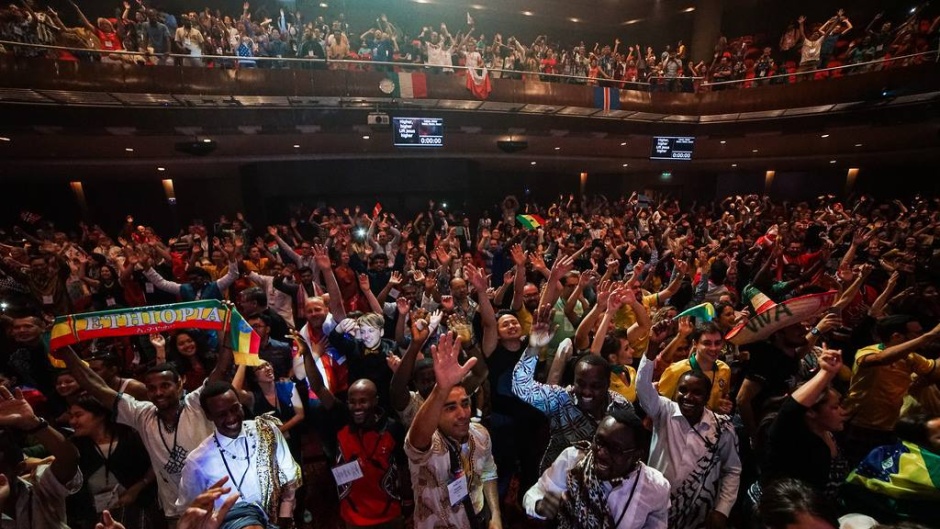We need polycentric leadership that draws on the resources of the worldwide body of Christ. Global wisdom is the antidote to the hidden virus of cultural captivity.
 Participants of the Lausanne Movement's Younger Leaders Gathering, in 2016, Jakarta (Indonesia). / Photo: [link]Lausanne Movement[/link].
Participants of the Lausanne Movement's Younger Leaders Gathering, in 2016, Jakarta (Indonesia). / Photo: [link]Lausanne Movement[/link].
Next week, 5,000 Christian leaders for almost every nation on Earth will gather in South Korea for the Lausanne Movement’s fourth global congress.
As I pack my bags, memories and lessons from Lausanne’s previous congress in Cape Town resurface, bringing a smile to my face and shaping my prayers for what the Lord might have in store for his church this year.
Here are 4 ways I was shaped by the previous global congress which, I hope, will also bless this year’s participants and wider church.
My wife and I were improbable participants at Cape Town 2010. We had just moved from Brazil to Italy and were yet to start the ministries we lead now. We were young, too: a couple of 28-year-olds who brought an 8-month baby with us.
But at Lausanne our youth wasn’t looked down on but cherished. Sarah went on to lead Lausanne’s 2016 Younger Leaders Gathering and encourage peers from all over the world to pick up the baton that was being passed on to our generation.
Instead of adopting a short-term horizon where we seek to accomplish world evangelization in our lifetimes, I realized it’s helpful to picture that immense task as a multigenerational relay race. As missiologist Andrew Walls put it, “Discipling a nation involves Christ’s entry into the nation’s thought, the patterns of relationship withing that nation, the way society hangs together, the way decisions are made. This has several implications. For one thing it means that discipling is a long process–it takes generations. Christian proclamation is for the children and grandchildren of the people who hear it.”
In our time, evangelicalism finds itself in a paradoxical state: a global, vibrant, and multilingual family of Christians that, in a number of countries, is being detoured by nationalism, division, cultural polarization, and the politization of religion.
It’s a set of challenges Christians are ill-equipped to overcome at the national level. But hidden in this paradox lies one of the keys for its solution: brothers and sisters from other cultures have a unique set of lenses to call out the idols we often don’t see in our cultures.
At Lausanne’s previous global congress, I was exposed to questions that arise from poverty and affluence, privilege and persecution, growth and decline, and how to flourish in majority and minority situations. I realized that, for such a complex agenda, we need polycentric leadership that draws on the resources of the worldwide body of Christ. Global wisdom is the antidote to the hidden virus of cultural captivity.
At the same time, participating in an international Christian congress helped to purify and mature my own “Brazilianness”. The moment that most moved me happened when one Brazilian delegate proposed that we ask forgiveness from Africans for the centuries of slavery in our country. So, the Brazilian delegation met one afternoon, Africans joined us, and this person confessed the evils born out of kidnapping and exploitation of Africans in our country.
We were all in tears. At that moment, I realized I have inherited sinful cultural patterns. I can be tempted to this day to judge people according to their appearance or social placement, because I have been raised in a society that done so for centuries. So I felt washed inside at that moment of collective confession.
This gesture prompted Africans to ask forgiveness for what ethnic groups have done to each other in the past. It was a taste of the redemptive power of Christianity that, I pray, the global church may experience anew in this year’s edition.
In the routine of life, the gospel’s mustard seed can seem small and insignificant. So it was inspiring to see with my own eyes that the Kingdom of God does indeed grow into an impressive, international tree. As I looked around me at Cape Town 2010’s closing ceremony, I could see participants dressed in national clothes worshipping our one Father and Lord.
We live by faith, not by sight (Hebrews 11:1). But isn’t a peek here and there of the life to come lovely?
René Breuel is the author of The Paradox of Happiness and the founding pastor of Hopera, a church in Rome.
He has a Master of Divinity from Regent College, Vancouver, and a Master of Studies in Creative Writing from Oxford University. You can learn more about his work at renebreuel.org.
[analysis]
[title]One more year[/title]
[photo][/photo]
[text]At Evangelical Focus, we have a sustainability challenge ahead. We invite you to join those across Europe and beyond who are committed with our mission. Together, we will ensure the continuity of Evangelical Focus and Protestante Digital (Spanish) in 2024.
Learn all about our #OneMoreYearEF campaign here (English).
[/text][/analysis]

Las opiniones vertidas por nuestros colaboradores se realizan a nivel personal, pudiendo coincidir o no con la postura de la dirección de Protestante Digital.
Si quieres comentar o